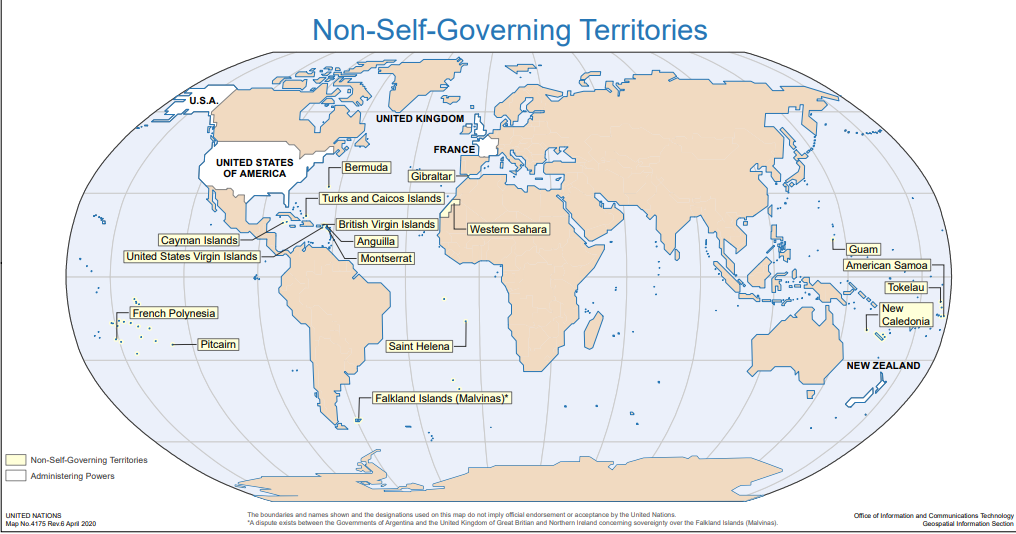Special Committee On Decolonization Session
Secretary-General António Guterres recently told the Special Committee on Decolonization that “we must commit to making 2022 a year of recovery for everyone.”
A spokesperson said, “On the cusp of the second year of the fourth Decade for the Eradication of Colonialism, the process of decolonization remains vital, United Nations Secretary-General António Guterres told the Special Committee on Decolonization today, underlining the importance of global cooperation to address the impacts of the COVID-19 crisis.”
The United Nations maintains a list of what they deem to be “Non-Self-Governing Territories”, and Bermuda is included, having been listed since 1946; with all the other British Overseas Territories are listed as well.
Along with Bermuda, the jurisdictions listed are Western Sahara, Anguilla, British Virgin Islands, Cayman Islands, Falkland Islands, Montserrat, St. Helena, Turks & Caicos, U.S. Virgin Islands, Gibraltar, American Samoa, French Polynesia, Guam, New Caledonia, Pitcairn, and Tokelau.
Map via the UN website of what they deem to be the “Non-Self-Governing Territories”
Secretary-General António Guterres said, “We must commit to making 2022 a year of recovery for everyone.”
The spokesperson said, “In a message delivered by Courtney Rattray, Chef de Cabinet, the Secretary-General opened the 2022 session of the 24-member body, known formally as the Special Committee on the Situation with regard to the implementation of the Declaration on the Granting of Independence to Colonial Countries and Peoples.”
Secretary-General Guterres said, “Coming from a former colonial country, I am perfectly aware of the devastating impact of colonialism on societies,” he continued. “These consequences are being felt to this day.”
The spokesperson said, “He went on to spotlight the challenges facing the Non Self-Governing Territories, pointing out that they made enormous efforts to address the pandemic despite some of them having fragile economies. In this regard, the support provided by the administering Powers, United Nations and other organizations has been, and will continue to be, of great importance.
“He also noted that, last year, the Committee was able to implement its new working method, allowing it to hear first from the Territories before considering related resolutions.
“The Committee went on to re-elect by acclamation Keisha McGuire [Grenada] as Chair of the Special Committee for 2022.
“Following her re-election, Ms. McGuire gave a brief summary of the 2021 session, noting that, despite the COVID-19 pandemic, the Special Committee held the first meeting in person in February 2021 and conducted the substantive session in June 2021, as scheduled. At the June 2021 session, delegates adopted a new working method allowing them to hear from the Territories first, and then review the related resolutions. In August 2021, the Caribbean regional seminar was successfully and safely held in Dominica. It was well attended despite the pandemic-related challenges.
“Furthermore, she said the Special Committee continued to operate by consensus, as it has always done. On 12 December 2021, New Caledonia held the third referendum on its accession to full sovereignty and independence, with a 43 per cent turnout and a majority voting “no” to independence. New Caledonia entered a transition period as defined by France, the administering Power, having gone through three referendums in the framework of the 1998 Nouméa Accord.
“The Special Committee will continue to accompany the decolonization process in New Caledonia in accordance with its mandate. The annual round of informal dialogue between the Bureau and all the administering Powers and stakeholders took place this January and February, including a meeting with France.
“As 2022 began, the second year of the fourth International Decade for Eradication of Colonialism, she said the world continues to feel the impact of the pandemic. Yet, the Special Committee’s goal remains the same: decolonization of the remaining 17 Non-Self-Governing Territories.
“She expressed hope that a visiting mission to the Non-Self-Governing Territories will resume this year, as the last such dispatch was to Montserrat in December 2019. “Time has come to renew our commitment […] Collectively we shall achieve concrete results,” she said.
“At the outset, the Special Committee elected its Bureau by acclamation, re electing Ms. McGuire as Chair, as well as Pedro Luis Pedroso Cuesta [Cuba], Arrmanatha Christiawan Nasir [Indonesia] and Alhaji Fanday Turay [Sierra Leone] as Vice-Chairs. Bassam Sabbagh [Syria] was elected as Rapporteur.
“Members also approved the document “Organization of work: relevant resolutions and decisions of the General Assembly [document A/AC.109/2022/L.1], as well the Special Committee’s tentative work programme and timetable [document A/AC.109/2022/L.2], with the understanding that it may be revised as necessary closer to or during the resumed substantive session in June.
“Other procedural matters addressed today included the costs and preparations for the Pacific Regional Seminar, which has yet to find a host from among its members from the Pacific region, and must urgently do so by 4 March at the latest; and the Committee’s reduced budgetary allocation, which attenuates its capacity to fully implement two important annual mandates: dispatching visiting missions to Non-Self Governing Territories; and organizing its regional seminars, thereby necessitating adjustments to the Special Committee’s travel plans.
“After their re-election to the Bureau, the representatives of Cuba, Indonesia, Sierra Leone and Syria took the floor to express their commitment to ending colonialism. Also speaking were the representatives of Iran and Iraq.
“The Special Committee will reconvene in March to begin its substantive work.”
Read More About
Category: All


